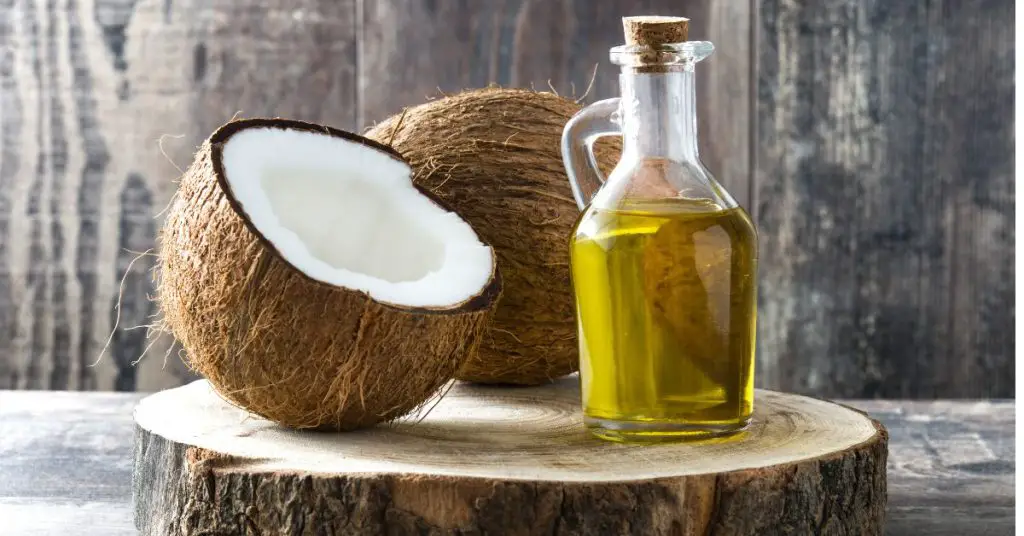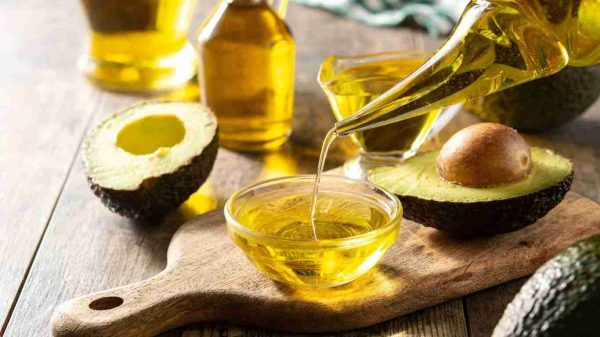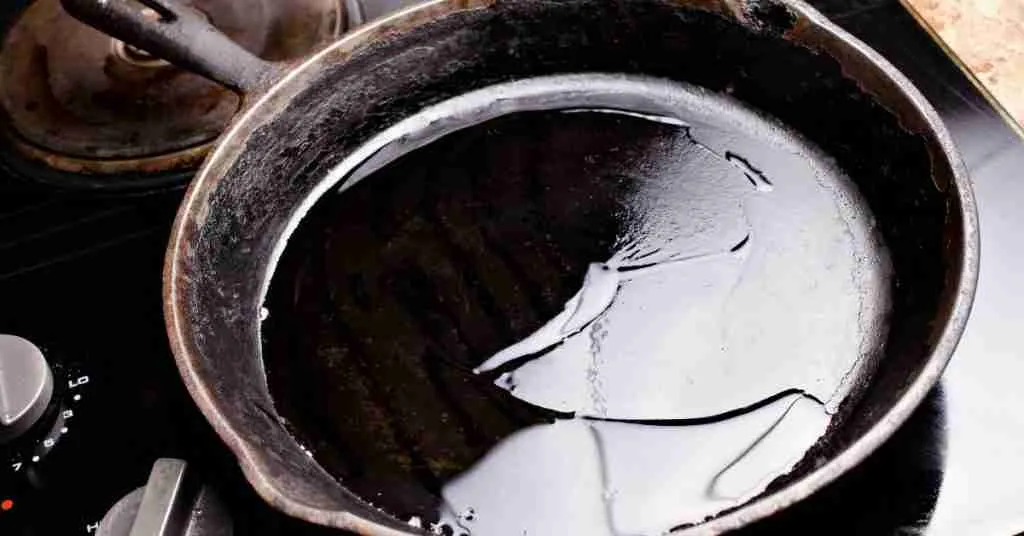Seasoning cast iron is necessary to create a natural non-stick layer, prevent rust, and prolong the pan’s life.
There are many oils to choose from when seasoning cast iron and coconut oil is one option that’s often considered. But can you season cast iron with coconut oil? Is it the best choice?
In this guide, we’ll explore the benefits and drawbacks of using coconut oil, provide a step-by-step seasoning method, and compare it with other popular oils for cast iron seasoning.

What Does It Mean to Season Cast Iron?
Seasoning cast iron is NOT sprinkling salt and pepper on your
This coating not only makes cooking easier but also protects the iron from moisture, reducing the risk of rust. Rust is formed on cast iron primarily from a lack of seasoning oil and too much moisture.
Regular seasoning builds up layers over time, resulting in a smoother surface and enhanced non-stick properties. It is what gives a black iron skillet that shiny black “patina” look that we all are so proud of and long to achieve.
Table of Contents
Can You Use Coconut Oil to Season Cast Iron?
Yes, you can use coconut oil to season cast iron, but there are a few things to consider first. Coconut oil has unique characteristics that can affect its performance as a seasoning oil.
Coconut oil is available in two types: virgin (unrefined) and refined. Virgin coconut oil is unprocessed and has a lower smoke point, while refined coconut oil has a higher smoke point and is often preferred for high-heat applications.
The smoke point is very important when choosing an oil for seasoning. You need to be aware of it because oils that smoke at lower temperatures may burn before properly polymerizing. We’ll get into this more in the next section.
Is Coconut Oil A High Smoke Point Oil?
The smoke point of an oil is the temperature at which it begins to smoke and break down. I realize this definition seems so simple, and it is really, but that’s it in a nutshell.
An oil with a high smoke point is preferred for seasoning cast iron because it can withstand the high heat required to form a strong layer of seasoning.
So, let’s look at the choices:
Virgin or (Extra-Virgin) Coconut Oil has a smoke point of approximately 350°F (177°C).
Refined Coconut Oil is slightly higher, and its smoke point is around 400-450°F (204-232°C).
Compared to other oils, coconut oil’s smoke point is on the lower side.
While refined coconut oil can be used for seasoning, oils with even higher smoke points, like avocado, grapeseed, or vegetable oils like Crisco, may create a better and stronger seasoning layer.
Crisco is actually a name brand for vegetable shortening. It was originally created to replace lard, an animal fat.
If you prefer to use coconut oil, though, choosing the refined variety is the better choice to avoid smoking issues during the seasoning process.
Can I Use Coconut Oil To Season Cast Iron?
There are pros and cons to using coconut oil for seasoning cast iron, so let’s examine a few.
Pros:
Availability and Accessibility: Coconut oil is widely available in grocery stores.
Health Benefits: Coconut oil contains beneficial fatty acids and is naturally anti-microbial.
Scent and Taste: Refined coconut oil has a neutral flavor, so it won’t leave a lingering taste on your cast iron.
Cons:
Lower Smoke Point: Compared to other oils like grapeseed or
Prone to Rancidity: Coconut oil can spoil or go rancid if cast iron is stored in humid or warm environments. Over time, this may result in a slightly off smell.
While coconut oil can work, these considerations may lead you to explore other oils, especially if you frequently use your cast iron at high heat.
Distinct Flavor: Unrefined coconut oil has a very coconut-like flavor and smell to it.
What is the Best Oil to Season Cast Iron with?
Here’s a comparison of popular oils for seasoning cast iron:
Flaxseed Oil: Often considered one of the best oils for seasoning due to its ability to create a hard, durable layer. It has a smoke point of around 225°F (107°C), making it suitable for low and slow seasoning. Because of this low smoke point and its tendency for the seasoning to flake off, I do not recommend flaxseed oil for seasoning cast iron.
Grapeseed Oil: With a smoke point of 420°F (216°C), grapeseed oil is a healthy oil and is commonly recommended for cast iron seasoning. It’s affordable, widely available, and leaves a smooth, non-sticky finish.
Vegetable Oil or Canola Oil: These oils have smoke points around 400°F (204°C) and are cost-effective and versatile.
Avocado Oil:
When choosing the best oil, consider the cooking temperatures you’ll use, the oil’s availability, and personal preference. Grapeseed and vegetable oils are excellent for general seasoning, while
How to Season Cast Iron with Coconut Oil (Step-by-Step Guide)
If you’ve decided to use coconut oil, here’s how to season your cast iron:
Clean the Cast Iron: Wash the cast iron with warm, soapy water, especially if it’s new or has rust. Dry thoroughly with a towel or heat it on the stove to remove any moisture.
Apply a Thin Layer of Refined Coconut Oil: Use a cloth or paper towel to apply a very thin layer of refined coconut oil to the entire surface, including the handle and edges. Avoid over-applying; a thin layer will polymerize more effectively. If you add too much oil and do not wipe it completely off before baking it in the oven, you can end up with a sticky mess.
Bake at High Temperature:
- Place the cast iron pan upside down in an oven preheated to 450°F (232°C).
- Put a baking sheet or foil underneath to catch any oil drips.
- Let it bake for an hour.
- Let it cool down naturally in the oven before repeating another round. I do this at night sometimes so it has time to completely cool, but it is not mandatory. I realize not everyone has an oven to do this so that you can season cast iron on the stovetop, too.
- Cool and Repeat: Turn off the oven and let the cast iron cool inside. For best results, repeat this process 2-3 times to build up layers of seasoning.
- If you need extra guidance on how to do any of these steps or something else related to cast iron, check out our Cast Iron For Beginners guide or send us a message, and we’ll be happy to assist you where we can.
- Regular Maintenance: After each use, clean and dry your cast iron thoroughly. A light layer of coconut oil can be applied as maintenance to keep the pan smooth.
Alternatives to Coconut Oil for Seasoning Cast Iron
If coconut oil doesn’t seem like the best fit, consider some of the other alternatives we mentioned, like Crisco, grapeseed, avocado, or canola oil, which have higher smoke points and are often recommended for their durability in cast iron seasoning.
Each oil type has its unique qualities, so feel free to experiment to find the best match for your cast iron care routine. I love bacon, so I use animal fats like bacon grease, lard, and beef tallow, too, with exceptional results.
Final Verdict:
Can You Season Cast Iron with Coconut Oil?
In conclusion, while it’s possible to season cast iron with coconut oil, refined coconut oil is preferable due to its higher smoke point. However, oils like grapeseed or
Frequently Asked Questions:
Is it okay to season cast iron with coconut oil?
Yes, it is okay to season cast iron with coconut oil.
Does coconut oil leave a taste when used to season cast iron?
Refined coconut oil leaves little to no flavor, making it suitable for seasoning without affecting the taste of food.
Can you season a cast iron pan with any type of oil?
Most oils can work, but oils with high smoke points, like grapeseed, avocado, or vegetable oil, are generally better suited for seasoning cast iron.
How often should you season cast iron with coconut oil or any other oil?
Season as needed, especially when the surface appears dull, or food starts to stick. Regular maintenance after each use also helps maintain the seasoning.



